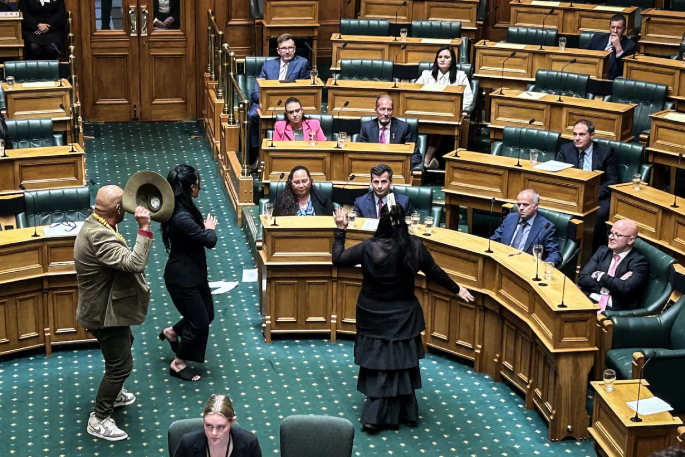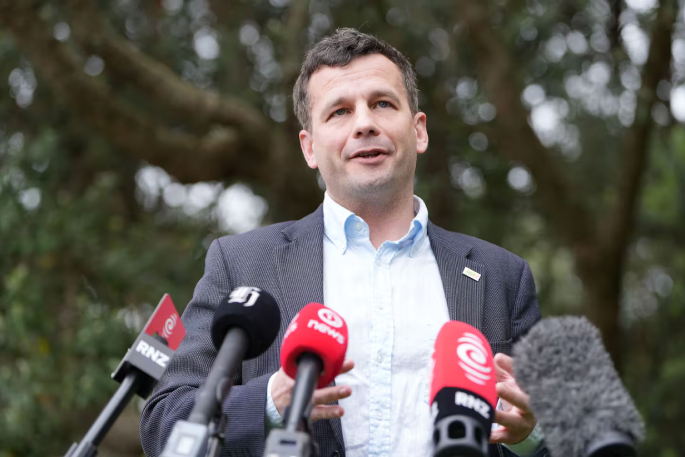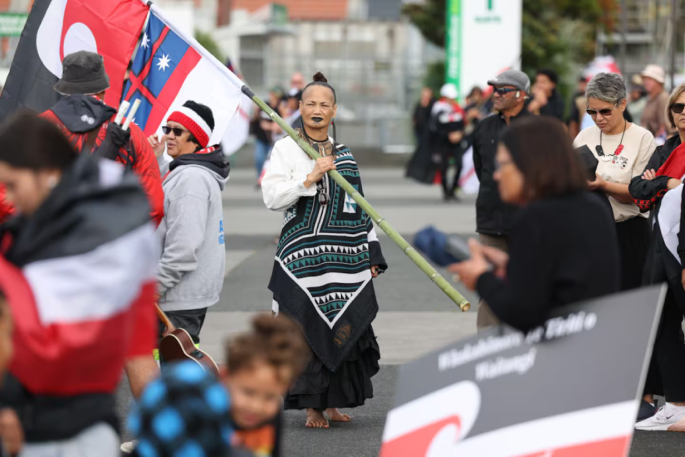Barbs are flying between senior Māori MPs after Parliament descended into chaos during the first reading of the Treaty Principles Bill when one of Te Pāti Māori’s new members was ejected from the House.
Government minister Shane Jones said Hana-Rawhiti Maipi-Clarke, one of the youngest MPs in New Zealand history at 22, ought to be put in jail for walking up to Act Party leader David Seymour and performing a haka during the debate.
But Māori Party co-leader Rawiri Waititi hit back about Jones’ past behaviour, saying he should consider his own questionable conduct while on official Government business before criticising others.
“When you’re using our Crown purchases to watch pornos, maybe that’s also a reason to go to prison,” Waititi said, referring to Jones having used his ministerial credit card to pay for pornographic films while staying at hotels in 2007 and 2008.
“Wake up, Shane, wake up. Look at your own backyard. Make sure you’re squeaky clean when it comes to representing our people,” Waititi said.
“He can go and have a shit, to be honest, and Winston Peters. Put that in your article.”

Members of Te Pāti Māori perform a haka in front of ACT MPs during the first reading of the Treaty Principles Bill in Parliament on Thursday. Photo / Adam Pearse
Waititi said Maipi-Clarke was doing what was culturally normal for her as Māori and said that, if other parliamentarians did not like it, “maybe you should think of leaving Parliament”.
Maipi-Clarke approached Seymour with her colleagues and co-leaders Waititi and Debbie Ngarewa-Packer to challenge him over his Treaty Principles Bill.
She was “named” by Speaker of the House Gerry Brownlee, one of the most severe and rare punishments MPs can face. She was suspended from Parliament for 24 hours, her pay was docked and her ability to take part in Question Time or votes in the House was removed.
Jones called the behaviour of Maipi-Clarke and her colleagues “threatening and ugly” and said it turned Parliament into a circus when he spoke on Newstalk ZB’s Heather du Plessis Drive show last night.
“Parliament has inherent powers to put people in jail and the way the Māori Party are carrying on, that seems to me quite the appropriate response,” he said.
“It turned into a circus with the Māori Party, in particular the young lady from Tainui,” Jones said, referring to Maipi-Clarke.
Former Speaker Sir Lockwood Smith told Newstalk ZB’s Mike Hosking Breakfast today that yesterday’s row was “as bad as I’ve ever seen the House”.
He said it was “really sad” to see in Parliament.
“The whole standard of the place has been lowered in recent years. Once you start letting it slip, another inch happens, another centimetre.”
He argued that standards had been slipping in the House for a while.
“Parliament is meant to be where people we chose to represent us … They are meant to be the leaders of our communities. Parliament is the highest court in the land, our most respected citizens.”
He said Brownlee should not be blamed and he had “no choice” but to clear the House.
But Waititi said a haka was “a natural tool that we use to support our debate”.
“We will use every single tool that our Māori kete [basket] has to support any kōrero [conversation] we have in a debate or wānanga [discussion]. Haka is a natural tool we use to support our debate.
“If you can’t handle that, then maybe you should think of leaving Parliament.”
Waititi said Māori MPs should be able to conduct themselves in a way relevant to their culture.
“Wherever you are, you always go and be proud to be Māori. Use every Māori tool you have to support your kaupapa [cause].
“It’s a natural thing for us to use haka.
“We’re not in England. I understand, when in Rome do as the Romans, but when you’re here in Aotearoa? Buckle up.”
Raphael Franks is an Auckland-based reporter who covers breaking news. He joined the Herald as a Te Rito cadet in 2022.
Sign up to The Daily H, a free newsletter curated by our editors and delivered straight to your inbox every weekday.

Act leader David Seymour. Photo / Ben Dickens
Seymour believes, over time, National may come around to the legislation.
“I think that they are perhaps less keen on taking on a tough issue. That has always been true. Act is a party that will take on hard issues and often, like Three Strikes, like charter schools, give it a few years and the National Party says, ‘best thing we ever thought of’.
“We are quite happy because we know there is no limit to what you can achieve if you don’t care who takes the credit.”
Late on Wednesday, a collective of King’s Counsels outlined their concerns about the bill, including that the proposed principles didn’t adequately reflect the articles of the Treaty and that it would cause significant legal confusion and uncertainty.
They noted that the existing principles have been developed by the courts over the past 50 years and now represented settled law.
The lawyers also said that while a select committee process allowed for public engagement, there should have been specific engagement with Māori prior.
“In addition to the obvious risk of a poor legislative outcome, this has created mistrust and calls into question whether the stated objective of an open, informed public debate is genuine.”
Seymour said on Thursday that he understood “why they don’t like” the bill.
“Eeryone gets a say, even if you’re not a KC,” he said.
“The debate over the Treaty has until this point been dominated by a small number of judges, senior public servants, academics, and politicians. The select committee process will finally democratise that debate.
“The courts and the Waitangi Tribunal have been able to develop principles that have been used to justify actions that are contrary to the principle of equal rights. Those actions include co-governance in the delivery of public services and ethnic quotas in public institutions.
“The Treaty Principles Bill provides an opportunity for New Zealanders – rather than the courts and the Waitangi Tribunal – to have a say on what the Treaty means. Did the Treaty give different rights to different groups, or does every citizen have equal rights? I believe all New Zealanders deserve to have a say on that question.”
The Waitangi Tribunal last week said the bill would be “the worst, most comprehensive breach of the Treaty/Te Tiriti in modern times”. It also argued there had been a lack of consultation with Māori.
“At present, the progressing of the bill is having serious impacts on the relationship,” the tribunal said. “But the bill, if enacted, would kill that relationship.”
Parliament is preparing for protests both inside and out as the bill gets its first reading this afternoon.
The Speaker is expected to warn members of the public that if there are any attempts to disrupt proceedings, he will clear the public galleries.
Brownlee would not comment on his plans for the debate, saying only that he intended to speak to the House at the start of the debate on the bill.
“I will be talking to the House at the start of the bill, but I’m not making any comments before that.”
Staff at Parliament were emailed this morning and advised protests were expected today and police would be on hand to help parliamentary security if there were any issues. Increased security measures will also be in place at Parliament next week – and public tours will be cancelled on Monday and Tuesday.
Thousands have been marching towards Wellington in opposition to the Treaty Principles Bill over recent days. The Hīkoi mō te Tiriti (march for the Treaty) moved through Auckland on Wednesday and is expected in the capital by next Tuesday.
The parliamentary staff email said the hīkoi was expected to be peaceful and organisers had been working with the Speaker’s office to ensure it did not breach the rules for protests on Parliament grounds.
Politicians from Labour, the Greens and Te Pāti Māori joined those protesting on Wednesday, including Te Pāti Māori co-leader Rawiri Waititi, who said he was proud of the unity on display in the hīkoi and expected the numbers to grow before it hit Wellington next week.
“By the time we get to Wellington, this would have quadrupled in size and in mass, because people are really concerned about how the country has been divided through legislation like the Treaty Principles Bill,” he said.

A national hīkoi protesting the bill is making its way south to Wellington, hitting the streets of Hamilton today. Photo / Mike Scott
Labour leader Chris Hipkins said the hīkoi showed people unified in not wanting “divisive politics”. He said it wasn’t too late for the Prime Minister to pull his support.
“The National Party can honour the commitment that it made to New Zealanders before the election and vote against this bill.
“They never should have agreed to it in the coalition agreement. They said before the election that they wouldn’t support it. I think they’ve betrayed voters’ trust in signing up to it as part of the coalition agreement.”
Jamie Ensor is a political reporter in the NZ Herald press gallery team based at Parliament. He was previously a TV reporter and digital producer in the Newshub press gallery office.


7 comments
Hmmm
Posted on 15-11-2024 18:26 | By Let's get real
Absolutely pathetic histrionics from clowns rather than politicians..
This does nothing to promote anything other than dismissive opinions of Maoridom and Maori politics.
The petulant stamping of your feet because you can't get everything your way, should be finished with long before you leave school.
It's absolutely no wonder, that overseas nations view the haka as quaint and irrelevant when it's being used in this fashion by people who might be asked to represent the nation overseas in diplomatic negotiations or international market development meetings.
Maori are being extremely poorly represented in the highest court in the land.
A New Low
Posted on 15-11-2024 18:38 | By Yadick
Te Pati have sunk our Parliament to a whole new low level. Their shenanigans are not welcome at all. All three members should have been named and suspended immediately. Their actions were nothing short of absolutely appalling, disgusting and disgraceful. It's not a bloody theatre stage, it's our Parliament. Threatening behavior like that should also involve Police action.
Abusive, divisive clowns
Posted on 15-11-2024 19:50 | By Bruja
Imagine if non-Maori MPs went onto a marae and behaved like this. Throw them out of Parliament, they are NOT worthy of being there. They OPENLY say they do not 'acknowledge this Parliament', criticise it continually but they take the FAT pay packets!!! Gutless, divisive, disrespectful hypocrites!
Wonder why
Posted on 16-11-2024 07:08 | By Angels
This country is going down the sewer with this craziness.
Maori are going to cause a true rebellion but not by them.
They will see the true fury from the people. We want a referendum to make Nz great again
@ Bruja
Posted on 16-11-2024 08:51 | By Yadick
Excellent comment. Some very good facts.
The circus came to town
Posted on 16-11-2024 09:34 | By Marie Randall
Parliament turned into a circus the day the coalition was formed had nothing to do with TPM the coalition had put their clowns out there if I was TPM I would have sold tickets
What worries me most about this
Posted on 17-11-2024 11:48 | By morepork
The young TPM member who did it, when interviewed afterward, said: "I only know how to be Maori." So, she is saying she never learned about civic responsibility as a NZ citizen in school or elsewhere, she doesn't understand the fact that she has a voice in a Democracy, she understands only that issues are settled by violence and intimidation? There is absolutely nothing wrong with "knowing how to be Maori" but if you are going to sit in the Parliament of our nation, you need to also know how to be a citizen of our society. Under Tikanga you obey the Rangatira; in Democracy, you have a voice. Issues are discussed and viewpoints are listened to, then a vote is taken. You don't have to give up "being Maori" any more than I give up ethnicity when I walk onto a marae. But I learn the protocols beforehand.
Leave a Comment
You must be logged in to make a comment.